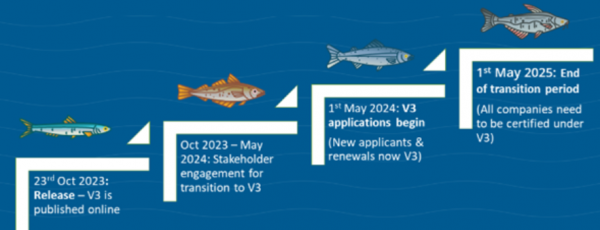IFFO conference: Data gaps in marine ingredients, reducing pressure on fish ecoystems, the era of precision nutrition

The global marine ingredients organization's event, an annual gathering, took place from 23 to 25 October in Cape Town, South Africa.
Andrew Russell, global lead, fish sustainability at Mars Petcare, discussed the company’s sustainability strategy, detailing the role played by fish ingredients in providing key nutrition to pets.
About 4% of fishmeal and 11% of fish oil production globally went towards pet food and other materials in 2020, delegates were told.
Fishmeal and fish oil provide vital nutrients at inclusion levels of 0.5% – 2%, varying between products and brands. The marine ingredients are prized for their omega-3 fatty acids, iron, iodine, vitamin D, and vitamin B12 provision.

Mars, said Russell, is committed to future proofing supply chains so that marine ingredient resources remain available. The business is committed to a net zero roadmap, to reduce pressure on fish ecosystems, while minimizing competition with the human food chain and ensuring no souring comes from endangered species.
The company, he continued, is working to protect critical habitats through collaboration, partnering with communities to restore coral reefs in coastal ecosystems. As with other industries, traceability is growing in importance, so Mars is investing in supply chain diligence as well as focusing on advancing human rights in the seafood industry.
It is also prioritizing the use of certified raw materials and supporting Fishery Improvement Projects (FIPs), which includes investing in WWF and Finance Earth’s Fisheries Improvement Fund.
Russell added: “We are committed to move more to by-products, maximizing their use more in the future.”
Precision nutrition
The industry needs to do better with the existing resources, focus on emerging trends and rising challenges, according to Dr Jorge Dias, general manager of Portugal based Sparos Lda. He was also speaking at the IFFO event.
Precision nutrition, he continued, allows for a judicious use of strategic ingredients to be made, hence avoiding over formulation; it helps control variations in raw material quality; and it guarantees a high quality feed, as well as a low feed conversion ratio (FCR). "This concept takes into account broader elements of production performance and sustainability criteria, but, in particular, focuses on the precise definition of nutrient and energy supply and the feed design specifications required to deliver that.”
Formulators need to cover the requirements of all essential nutrients, promote the well-being of the animals, ensure good feed intake, and now also incorporate carbon-footprint metrics, he said.
Fishmeal, and fish oil supply are now seen as strategic or functional ingredients as they bring benefits beyond the coverage of nutritional requirements, noted Dias.
Marine ingredients are often used in the early growth stages, but this fluctuates from region and species. Taking a closer look at the optimal range of amino acids, in terms of protein digestibility but also the metabolic protein use is key to focusing on relevant nutrient costs, said the fish nutrition expert.
Filling the data gaps in marine ingredients
Jorge Diaz Salinas, global sustainability manager at aqua feed manufacturer, Skretting, raised awareness about the data that is needed to carry out LCAs as per Product Environmental Footprint Category Rules (PEFCR).
Marine ingredient suppliers need to work on their own primary data and there are many gaps that the industry needs to fill, said the sustainability lead.
Raw materials used in the feed are the main driver of emissions by the feed sector and tracking and reduction of that footprint can only be achieved with the correct data, he stressed.
To calculate carbon and water footprints, and all the other impacts required under the LCA process, data from various stages in ingredient production is required even down to the types of fishing vessels used, their construction, the use of refrigerants, and fuel used in the operation, on top of the impacts linked to the actual processing. "Marine ingredients have a low carbon footprint compared with terrestrial ingredients. They represent 10% of Skretting's carbon footprint. However, we need a more holistic view, taking other parameters into account, such as biodiversity impacts.”
Provenance, traceability
The need for data was echoed by Dr Wesley Malcorps, postdoctoral researcher at the Institute of Aquaculture, University of Stirling, who explored how understanding where and how seafood is produced is crucial to verify the status of those raw materials in relation to laws on food safety and production practices. That information is also critical for the LCA story as raw material origin plays a big part in how environmental burdens are allocated, he said.
“We need to first define what sustainability is and decide on what we want to achieve first. Sustainability is a journey, not an endpoint and saying that something is sustainable can limit further improvements."
Sustainability is not just about the environment, but includes many aspects, such as social and economic aspects as well as fish welfare indicators.
Businesses need to identify key data elements and who needs them, including the end consumers to inform their choices and drive market change, continued Dr Malcorps.
Feeds perform differently depending on the impact categories used and companies need to understand the trade-offs between these different environmental and social impacts, and marine and terrestrial environments. "if we are going to produce more sustainable marine ingredients, we need to use more byproducts. Traceability is crucial to ensure that byproducts are from safe and sustainable resources.”
The use of a shared network along the supply chain is the way forward, he argues. This could be done by using IoT devices, with a trusted database that is not managed by a single authority, immutable, decentralized, and hard to hack. It is important to note, that in a shared network, participants need incentives to share data, and they need to feel that protected, and that they are not being monitored, said the academic.
This week saw MarinTrust release the new version of its Factory Standard.
Version 3, it said, lays the foundations towards fully traceable marine ingredients and progresses the standard's focus on environmental and social impacts, both at the factory and on the vessels supplying whole fish. It also aims to increase accessibility for responsibly sourced and produced marine ingredients and encourage the use of by-products.
Libby Woodhatch, executive chair of MarinTrust, commented: “This version comes towards the end of a rigorous, long term development process, closely overseen by MarinTrust’s multi-stakeholder governing body committee. It included pilot assessments across the world and feedback from key marine ingredient stakeholders to enhance the consistency and robustness of audits.”
A 60-day public consultation, run in May and July this year, resulted in a public report and provided 22 responses from a wide group of stakeholders all over the world, she added.
The Factory Standard’s new version will be effective on May 1, 2024, said Francisco Aldon, CEO of MarinTrust. “This date marks the day when all sites applying for a MarinTrust certification or a certification renewal will have to comply with the updated requirements. As for the sites already certified against the MarinTrust Factory Standard, May 1, 2024 marks the start of a year-long transition period, allowing for adjustments to be made by every factory until May 1, 2025.”














